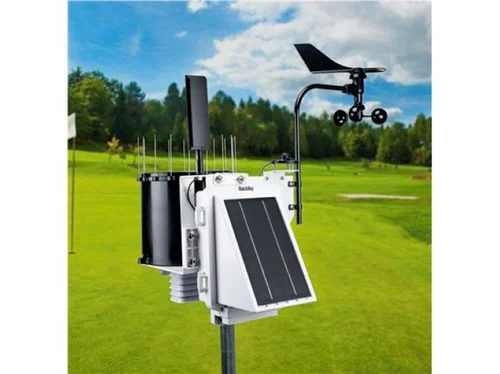WatchDog 3250 ET Station Data Recorder
₹2.3
| Brand | SPECTRUM |
| Models | WatchDog 3250 ET Station Data Recorder |
- Main Domestic Market All India
Product DescriptionWatchDog 3250 Wireless ET StationUse real-time ET data to effectively irrigate for optimum yield and quality.
The fully integrated WatchDog 3250 Wireless ET Station measures temperature, humidity, rainfall, and wind speed & direction, recording and communicating the data to the cloud using its internal modem or radio. With these sensors, evapotranspiration (ET) can be computed by SpecConnect, and you can know how much water is leaving your fields.
-
Integrated Solar Power system for reliable power.
-
Integrated Modem/Radio for reliable communications: available with a choice of cellular modems or other radios.
-
Integrated Data Logger protects your data. Holds over 18 months of data at a 15-minute recording interval. Data can be transferred to a USB flash drive.
-
Easy to install – be running in minutes. Mounts to a 1.25 inch mast. U-bolts included.
-
Bluetooth connectivity to your Apple or Android smartphone running the free WatchDog Mobile App speeds setup and displays current conditions.
-
Sends data to the SpecConnect Cloud Solution – View current conditions or historical data using a broad selection of analytical reports from anywhere in the world.
-
Receive alerts via automated phone call, text message, and/or email immediately when temperature crosses your selected threshold – no waiting for the next scheduled upload.
-
Customizable with plug-in sensors to meet your needs
-
Receive the latest changes with over-the-air updates (also available via a USB flash drive).
-
The durable enclosure provides moisture, corrosion, and UV protection for increased reliability in harsh environments.
-
Designed and manufactured in the USA to provide the quality data you can rely on.
Communication Options
- Item 3250MU has an LTE-M cellular modem, providing LTE CAT-M1 and NB-IoT communications. Requires SpecConnect subscription.
- Item 3250HU has a 3G/HSPA+ cellular modem. Requires SpecConnect subscription. (Not for use in the USA)
You must be logged in to post a review.
Q & A
Weather stations play a crucial role in sustainable farming practices by providing accurate and timely weather information. Here are some ways in which weather stations contribute to sustainability in farming:
Water conservation: Weather stations help farmers optimize irrigation practices by providing real-time data on rainfall, humidity, and evapotranspiration rates. This information allows farmers to adjust their irrigation schedules based on actual weather conditions, minimizing water waste and reducing the risk of over- or under-irrigation.
Crop management: Weather stations provide valuable data on temperature, wind speed, and solar radiation, enabling farmers to make informed decisions regarding planting, crop selection, and pest management. By monitoring weather patterns, farmers can anticipate potential risks such as frost, drought, or disease outbreaks, and take preventive measures accordingly, reducing the need for excessive pesticide or fertilizer applications.
Energy efficiency: Weather stations help optimize energy use in farming operations. By tracking weather conditions, farmers can schedule activities such as machinery operation, ventilation, or greenhouse heating based on real-time information. This ensures that energy-consuming operations are aligned with weather conditions, reducing energy waste and associated carbon emissions.
Resource allocation: Accurate weather data from stations enables farmers to plan and allocate resources more efficiently. For example, farmers can adjust their planting schedules based on precipitation forecasts, minimizing the risk of seed or fertilizer runoff and nutrient pollution in water bodies.
Climate adaptation: Weather stations provide valuable data for long-term climate monitoring and analysis. By tracking trends and changes in weather patterns, farmers can make informed decisions about adapting their farming practices to climate change. This might involve adjusting crop varieties, changing planting dates, or implementing new irrigation strategies to mitigate the impact of changing weather conditions.
Precision farming: Weather station data, when integrated with other technologies such as satellite imagery and soil sensors, allows for precision farming practices. Farmers can precisely target irrigation, fertilization, and pest control efforts based on localized weather conditions and specific crop needs. This approach minimizes input waste, reduces environmental impact, and improves overall farm productivity.
Overall, weather stations are essential tools for sustainable farming practices as they provide farmers with valuable information to make informed decisions, optimize resource use, and mitigate risks associated with weather variability and climate change.
General Inquiries
There are no inquiries yet.

















Reviews
There are no reviews yet.